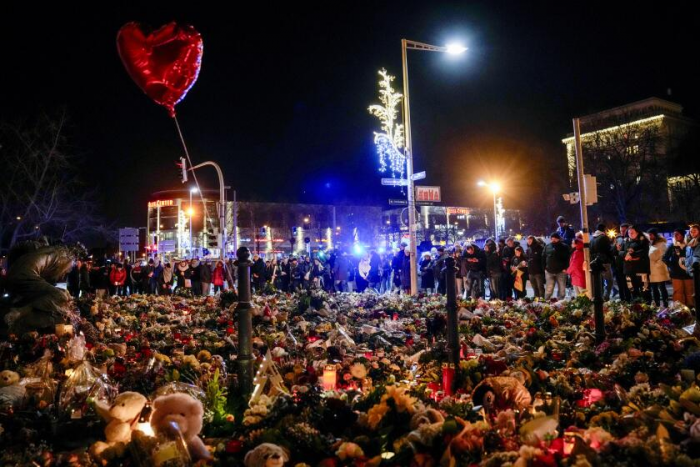Berlin (AP)-former German Foreign Minister Angela Merkel issued a public complaint rarely to her successor as leader of the country’s center-right party, the first of Germany’s elections next month, for putting the proposals of Parliament for new migratory regulations that were approved alone. with that of an extreme right party.
The guiding parties of the German middle have questioned the fact that the conservative leader Friedrich Merz can still be faithful not to bring the excessive right choice to Germany or AFD to the government after the occasions on Wednesday. He insists that he did not do it and will not paintings with it, and that he has not damaged political consensus, called a “firewall”, to avoid the party. But Chancellor Olaf Scholz said Merz had made “an inexcusable error”.
Merz, decided to show his Central Law Union bloc’s commitment to curbing abnormal migration after a fatal knife attack last week through a rejected asylum seeker, put a non-binding move to Parliament calling on Germany to make much more migrants back at its borders, the parent company would possibly require help from the AfD to get through. The measure has risen thanks to the help of the faraway party.
Polls show Merz’s Union leading ahead of the Feb. 23 election with around 30% support, while AfD is second with about 20%, and Scholz’s center-left Social Democrats and their remaining coalition partners, the Greens, are further back.
Merkel, a former leader of the Christian Christian Union of Merz, said in a rare statement that Merz had declared in November that no measure deserves to be followed with the AFD before the February 23 elections.
She said she had supported this publication, but “I think it was incorrect not to feel committed to this proposal and, on January 29, light a majority open with your eyes with AFD votes in the German Parliament.
Merkel added that “all democratic parties” must work together — “not as a tactical maneuver,” and while respecting European Union law — to do everything to prevent attacks such as last week’s and others in recent months in which the suspects were immigrants.
Merz took care of the CDU after Merkel, a former rival, resigned as a chancellor in 2021. A more conservative figure took a more restrictive position on migration. He said last week that Germany had an “erroneous asylum and immigration policy” for a decade, since Merkel gave several migrants in the country.
Merkel has largely kept a low profile since leaving office, doesn’t usually comment on day-to-day politics and is no longer actively influential in her party. However, her intervention could be problematic for Merz.
Merz turns out that he wins through the decisive union by forcing a more complicated technique to migration, eliminating the attractiveness of AFD anti -immigration, while weakens the center of the left and the Greens. That this will succeed.
AFD lawmakers celebrated after Wednesday’s vote, while others sat in stony faces. Merz said he had sought a majority in the “Democratic Center” and that he regretted that this did not happen. But he also insisted that “a correct resolution is not because other people approve of it. “
On Friday, the union plans to call a vote on the proposed law that demands an end to the meetings of the circle of relatives for migrants with coverage prestige that does not fall under asylum. The measure can also approve with votes of the AFD, it would require the approval of the superior space of Parliament, which is uncertain.
This week’s occasions have soured the political environment and would possibly complicate efforts to shape a coalition after the election, which may also leave Merz short of center-left parties to take power.
Wolfgang Schroeder, a political science professor at the Berlin Social Science Center, said they were a “breach of the informal firewall” and a “toxic intervention by Merz and the CDU,” which may help them in this election but are likely to have negative effects in the longer term.
He said this week’s occasions in Parliament are “a symbolic policy that is not underestimated,” but he also said he would “be careful about the status of a historic moment. “
Moulson writes for Associated Press. Kerstin Sopke in Berlin contributed to this report.
Subscribe for unlimited accessSite Map
Follow Us
More from the Los Angeles Times

